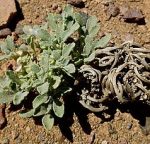
Also known as rose of Jericho, Maryam’s flower, flower of St. Mary, St. Mary’s flower, Mary’s flower, and white mustard flower, this annual herb is native to the deserts of western Asia and is a member of the mustard family, Brassicaceae, that also includes cabbage, broccoli, and alyssum. The prostrate plant grows about 6″ tall and has a heavy tap-root that produces a 12″ wide flat disc like structure of numerous slender branches that bear small, obovate, gray leaves and tiny, white, axillary flowers. When dryness occurs the leaves drop, and the branches contract into a tight ball with the tips at the top and the fruits inside and attached. At this point the wind may break the ball from the root and blow it around as a tumbleweed. The seeds can remain dormant for years and when the rains come again the ball containing them uncurls, the plant seems to come to life again, the seed capsules pop open, and the seeds germinate. Photo Credit Wikipedia
The Hebrew word gulgal is translated by a variety of words including dust/whirling dust, wheel, dried or dried thistles, rolling thing, and tumbleweed. Some authorities identify the plant as Palestinian tumbleweed but an alternative choce is thistle-like Gundelia tournefortii.
Psalms 83:13 (NIV) Asaph prays that God will scatter the enemies of Israel.
“Make them like tumbleweed, my God, like chaff before the wind.”
Isaiah 17:13 (NIV) The prophet tells the people that God will rebuke Israel’s enemies and chase them away.
“Although the peoples roar like the roar of surging waters, when he rebukes them they flee far away, driven before the wind like chaff on the hills, like tumbleweed before a gale.”
Palestinian tumbleweed likes full sun and sandy, dry, well-drained soil but needs water to reproduce. Propagation is by seed.
The genus name, Anastatica, comes from the Greek word anastasis, meaning resurrection, referring to the fact that no matter how dry the plant gets it can recover its shape by being placed in water. The specific epithet, hierochuntica, comes from the classical name for the town of Jericho, Hierikous.